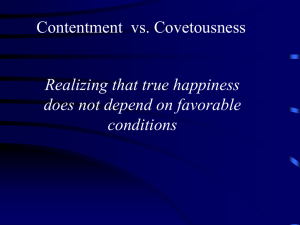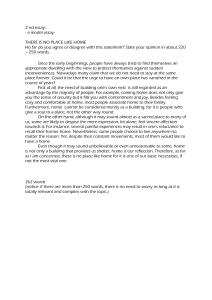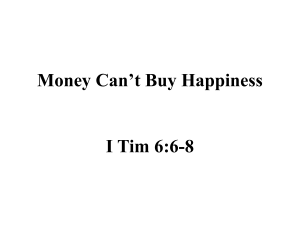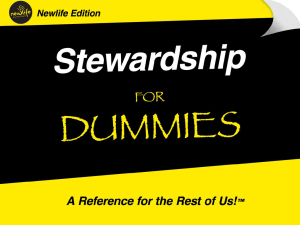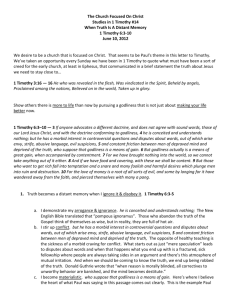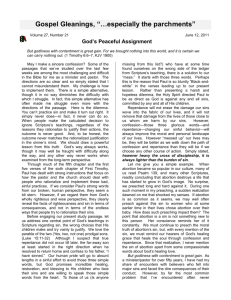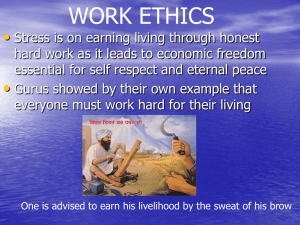9-15-13-AM-Manuscript - First Baptist Church Powell
advertisement
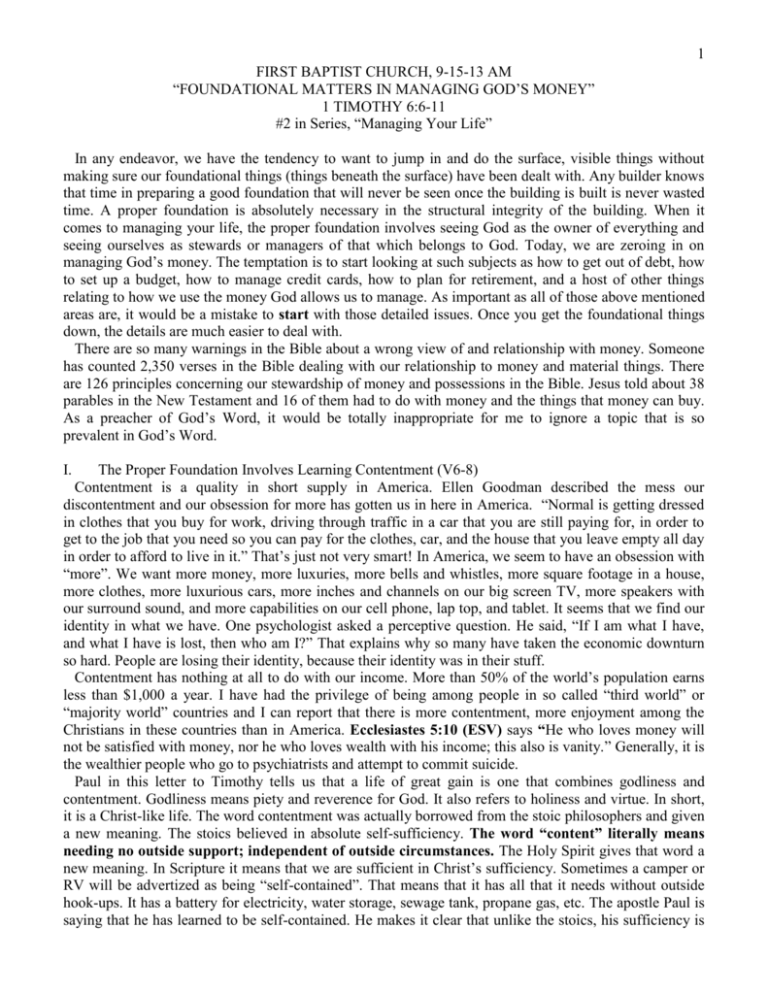
1 FIRST BAPTIST CHURCH, 9-15-13 AM “FOUNDATIONAL MATTERS IN MANAGING GOD’S MONEY” 1 TIMOTHY 6:6-11 #2 in Series, “Managing Your Life” In any endeavor, we have the tendency to want to jump in and do the surface, visible things without making sure our foundational things (things beneath the surface) have been dealt with. Any builder knows that time in preparing a good foundation that will never be seen once the building is built is never wasted time. A proper foundation is absolutely necessary in the structural integrity of the building. When it comes to managing your life, the proper foundation involves seeing God as the owner of everything and seeing ourselves as stewards or managers of that which belongs to God. Today, we are zeroing in on managing God’s money. The temptation is to start looking at such subjects as how to get out of debt, how to set up a budget, how to manage credit cards, how to plan for retirement, and a host of other things relating to how we use the money God allows us to manage. As important as all of those above mentioned areas are, it would be a mistake to start with those detailed issues. Once you get the foundational things down, the details are much easier to deal with. There are so many warnings in the Bible about a wrong view of and relationship with money. Someone has counted 2,350 verses in the Bible dealing with our relationship to money and material things. There are 126 principles concerning our stewardship of money and possessions in the Bible. Jesus told about 38 parables in the New Testament and 16 of them had to do with money and the things that money can buy. As a preacher of God’s Word, it would be totally inappropriate for me to ignore a topic that is so prevalent in God’s Word. I. The Proper Foundation Involves Learning Contentment (V6-8) Contentment is a quality in short supply in America. Ellen Goodman described the mess our discontentment and our obsession for more has gotten us in here in America. “Normal is getting dressed in clothes that you buy for work, driving through traffic in a car that you are still paying for, in order to get to the job that you need so you can pay for the clothes, car, and the house that you leave empty all day in order to afford to live in it.” That’s just not very smart! In America, we seem to have an obsession with “more”. We want more money, more luxuries, more bells and whistles, more square footage in a house, more clothes, more luxurious cars, more inches and channels on our big screen TV, more speakers with our surround sound, and more capabilities on our cell phone, lap top, and tablet. It seems that we find our identity in what we have. One psychologist asked a perceptive question. He said, “If I am what I have, and what I have is lost, then who am I?” That explains why so many have taken the economic downturn so hard. People are losing their identity, because their identity was in their stuff. Contentment has nothing at all to do with our income. More than 50% of the world’s population earns less than $1,000 a year. I have had the privilege of being among people in so called “third world” or “majority world” countries and I can report that there is more contentment, more enjoyment among the Christians in these countries than in America. Ecclesiastes 5:10 (ESV) says “He who loves money will not be satisfied with money, nor he who loves wealth with his income; this also is vanity.” Generally, it is the wealthier people who go to psychiatrists and attempt to commit suicide. Paul in this letter to Timothy tells us that a life of great gain is one that combines godliness and contentment. Godliness means piety and reverence for God. It also refers to holiness and virtue. In short, it is a Christ-like life. The word contentment was actually borrowed from the stoic philosophers and given a new meaning. The stoics believed in absolute self-sufficiency. The word “content” literally means needing no outside support; independent of outside circumstances. The Holy Spirit gives that word a new meaning. In Scripture it means that we are sufficient in Christ’s sufficiency. Sometimes a camper or RV will be advertized as being “self-contained”. That means that it has all that it needs without outside hook-ups. It has a battery for electricity, water storage, sewage tank, propane gas, etc. The apostle Paul is saying that he has learned to be self-contained. He makes it clear that unlike the stoics, his sufficiency is 2 not in himself; it is in Christ. He said in 2 Corinthians 3:5 (NKJV) “Not that we are sufficient of ourselves to think of anything as being from ourselves, but our sufficiency is from God”. It is interesting that Paul died victorious saying that he had run his race, finished his course, and kept the faith and looked forward to heaven and the crown of righteousness, while Cato, the leading stoic philosopher, committed suicide. Here is my favorite definition of contentment: “Christian contentment is the God-given ability to be satisfied with the loving provision of God in any and every situation.” [Charles Kelley, quoted in David Jeremiah, “Turning toward Joy”, Page 191]. Contentment is rooted in godliness, not in money and stuff. Before we can overcome the temptation to love money, we must learn to be content. Contentment isn’t natural; it must be learned. Philippians 4:11 (NKJV) says “Not that I speak in regard to need, for I have learned in whatever state I am, to be content”. The natural man and even the Christian who is not walking in the fullness of the Holy Spirit are never content in the realm of possessions. Because of their discontentment they are slaves to possessions and their wants for more stuff. In the third century, Cyprian, the Bishop of Carthage observed this: “Their property held them in chains … chains which shackled their courage and choked their faith and hampered their judgment and throttled their souls … They think of themselves as owners, whereas it is they rather who are owned: enslaved as they are to their own property, they are not the masters of their money but its slaves” [Quoted in Randy Alcorn, “Money, Possessions, and Eternity”, Page 416]. Far from being natural, contentment must be learned. The word “learned” in Philippians 4:11 means to learn by experience. When Christ is not just in your life, but CHRIST IS YOUR LIFE, you will discover, you will learn that He is all you need. In verse 7 we see that we leave physically from this earth with exactly what we came in with – nothing! Ecclesiastes 5:15 (HCSB) says “As he came from his mother’s womb, so he will go again, naked as he came; he will take nothing for his efforts that he can carry in his hands.” People who spend their earthly lives pursuing money and stuff are giving their lives for that which is locked into time and space. They ignore that which is eternal and at death all they lived for is left behind. How incredibly sad! Verse 8 tells us what is truly necessary here in this vapor between our birth and our death. 1 Timothy 6:8 (NASB) “If we have food and covering, with these we shall be content.” The word “clothing” in the NKJV is a general word that means covering. It includes shelter and clothing. Those are the necessities of life – food, some kind of housing to keep us from the elements (even a tent), and clothing for our bodies. Everything above that is not sin, but it tends to complicate our lives. Spurgeon tells of an elderly lady, long before the days of welfare or social security, who had only a piece of bread and a little water. As she prepared to consume it, she said, “What! All this and Christ too?” If you are not content with what you have now, you wouldn’t be content with billions! To whom little is not enough, nothing is enough. I know that some don’t believe that, but it is true! While it certainly isn’t wrong to have more than these necessities, it is wrong and you are treading on very dangerous ground when you begin depending on them for your contentment. II. The Proper Foundation Involves Fleeing From the Love of Money (V9-11a) The love of money and discontentment always travel together. Discontentment breeds the love of money and the love of money causes us to be discontent with the basics of life. Verse 9 speaks of the desire to be rich. That is synonymous with the love of money. The word translated “desire” speaks of a settled desire, a consuming passion. In the first part of verse 11, Paul tells Timothy to flee this love of money that is the root of all kinds of evil. Sometimes fleeing is cowardice. In Nehemiah when his life was threatened for obeying God and it was suggested that he flee, Nehemiah said in Nehemiah 6:11b (NKJV) "…Should such a man as I flee?” However, there are three times in the Scripture that we are told to flee. We are told to flee immorality in 1 Corinthians 6:18a (NKJV) “Flee sexual immorality…” We are told to flee idolatry in 1 Corinthians 10:14 (NKJV) “Therefore, my beloved, flee from idolatry.” Here, we are told to flee from the love of money. Do whatever it takes to destroy this idol, this false god. Let’s see some specific dangers, problems and pitfalls that come to those who ditch contentment and begin to desire to be rich and thus to love money. A. They Fall into Temptation and a Snare (V9a) 3 When a person’s settled desire and passion is to be rich, they are in great danger. A godly leader in the church in Romania before communism fell had been through persecution and had been imprisoned more than once for his faith. Here is what he said about the danger of riches. “In my experience, 95% of believers who face the test of persecution pass it, while 95% of those who face the test of prosperity fail it.” The word “fall” in verse 9 is in the present tense. Those who desire to be rich are continually falling into temptation and snares (traps). This falling is the pattern of their lives. The desire for riches is a trap. This desire to be rich is nothing less than greed. We treat greed as a rather minor sin, but look at what God says about it in Colossians 3:5 (NASB) “Therefore consider the members of your earthly body as dead to immorality, impurity, passion, evil desire, and greed, which amounts to idolatry.” The desire to be rich is considered by God to be idolatry! Idolatry is a sin with severe consequences. B. They Fall into Foolish and Harmful Lusts (V9b) The word “lust” in Scripture is much broader than sexual desires. It is a strong controlling, consuming desire for anything. These desires to be rich are foolish because they are illogical and irrational. They are harmful because they capture us and divert us from a life that honors God and glorifies Him. By being in the same church for close to three decades, I have had the opportunity to observe these warnings being disregarded and then see the harm that comes. I have watched families that love the Lord and serve Him and then they begin to be sucked in by the desire to be rich; they fall into temptation and snares. I begin to see church attendance drop off and ministry involvement drop off. I don’t check giving records, but I know that their giving drops off and they often move to a nicer home further away from the church, drive nicer cars, take more extravagant vacations, and then they’re gone. When they are approached by people who care, they talk about how busy they are, how their children are involved in this and that, and how far it is to come to church from their new neighborhood. Some of the time they try to justify their change in priorities by criticizing the preaching, the direction of the church, or that the church isn’t the same as it used to be and they just don’t connect anymore. What happened? They have fallen into the snare, the trap of desiring to be rich. Discontent with what they had, they gave in to the temptation to go after more and more stuff and gave in to foolish and harmful strong desires and they were captured. What comes next is drowning in destruction and perdition. That is translated “ruin and destruction” in most translations. Notice the connection – love of money, ruin, and destruction. That is why we must flee from the love of money, greed, and covetousness. It will destroy you! C. They Fall into All Kinds of Evil (V10) The love of money is so devastating in a life! Let me point out the obvious. Money is not evil. Money is neutral; money is dangerous, but money is not evil in and of itself. What is sin is the love of money. That is one word in the original language. It literally means “affection for silver”. This love of money becomes the root that produces all sorts of evil. In Joshua 7 it was the love of money that moved Achan to take spoils from a battle that God forbade to be taken and that brought death and disgrace to his family and defeat to Israel. King Solomon’s love of money was the root of his disobedience of Deuteronomy 17 and God’s prohibitions for the coming kings. It was the love of money that moved Ananias and Sapphira to lie to God and be struck dead. Love of money that moved Judas to steal from the offering given to Jesus and His disciples and to betray the Lord. Paul says that some have strayed from the faith and because of their greediness or love of money, they have pierced themselves through with many sorrows. Though Paul doesn’t name names, it seems certain that he would have had in mind his associate Demas of whom Paul said in 2 Timothy 4:10a (HCSB) “for Demas has deserted me, because he loved this present world…” When one walks away from God and His church motivated by their love of money, they will end up piercing themselves with many pains and sorrows. They will eventually replace God with gold and ruin their lives. III. The Proper Foundation Involves Pursuing the Things that Please God (V11b) The Greek word translated “pursue” means to follow after or to press toward. It carries the idea of going after something different. What do we pursue after we have turned from pursuing money? We are to pursue righteousness. Righteousness is in this context personal integrity. Flee all financial compromises 4 and follow personal integrity. We are to pursue godliness which is the internal counterpart to righteousness. A life of integrity flows out of an internal godliness which is a commitment to holiness and a Christ-like life. Faith is simply stepping out in obedience to God in total dependence believing that He meant what He said. We are to pursue love which always focuses on the needs of others rather that our own desires and comfort. 1 Corinthians 16:14 (NKJV) “Let all that you do be done with love.” We are to follow after patience. Patience is the continuing on when we are pressured to quit. It is victorious endurance in spite of adversity, suffering, and even persecution. Gentleness is meekness and humility. Humility and the love of money cannot exist together. If you would deal with the love of money God’s way, you will flee this manifestation of idolatry and pursue righteousness, godliness, faith, love, patience, and gentleness. These are the qualities that please God. CONCLUSION Allow me to conclude by giving you something very practical that you can do to help protect yourself from this love of money. You should begin tithing. Perhaps tithing is the most misunderstood practice the Bible commands. Mike Powell, our Elder for administration and leadership and the only Elder who has access to giving records of members, estimates that 15-20% of our members tithe. That’s pretty pathetic, but actually it is a higher percentage than the average in our denomination. The word “tithe” means tenth part. We are told that the tithe was practiced before the Mosaic Law by Abraham and Jacob. I think it would be safe to assume that it was practiced by all of the Patriarchs. The tithe was then incorporated into the Mosaic Law. Actually there were three tithes in the law. Though the tithe is not specified in the epistles of the New Testament, proportional giving is taught. Also, we know from church history that the early church practiced tithing. Irenaeus (Last Quarter of the Second Century) was the Bishop of Lyons was trained and discipled by Polycarp who was discipled by the Apostle John said: “The Jews were constrained to a regular payment of tithes; Christians, who have liberty, assign all their possessions to the Lord, bestowing freely not the lesser portions of their property, since they have the hope of greater things.” I think that Irenaeus would agree that the tithe would be the bare minimum of giving. [Quoted in Randy Alcorn, Money, Possessions, and Eternity, page 174]. Tithing serves as a regular reminder to us and a testimony to our family that God is the owner of all. Nothing we hold control over is ours. If we are having trouble with this absolute minimum of regular giving, it is an indication that we have unwisely used God’s money and that we must take radical drastic action to deal with the love of money that we have been guilty of in getting in this mess. Tim Keller responds to those who justify not giving by saying that the tithe was Old Covenant law answers this way: “‘I’ll tell you why you don’t see the tithing requirement laid out clearly in the New Testament. Think. Have we received more of God’s revelation, truth, and grace than the Old Testament believers or less?’ Usually there is uncomfortable silence. ‘Are we more debtors to grace than they were, or less? Did Jesus tithe His life’s blood to save us, or did He give it all?’ Tithing is a minimum standard for Christian believers. We certainly wouldn’t want to be in a position of giving away less of our income than those who had so much less of an understanding of God did to save them.” [Tim Keller, Counterfeit Gods, Page 62]. How is your contentment? Are you fleeing the love of money? Are you pursuing those things that please God? Are you tithing? Today would be a great time to start. (3170)
